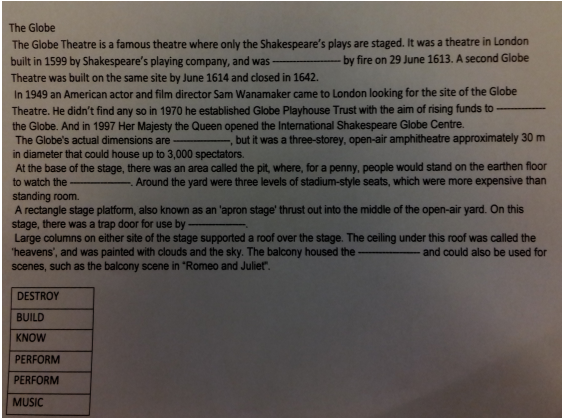Фрагмент уроку в 7 класі
Фрагмент уроку у 7 класі з теми «Вільям Шекспір і його театр Глобус»
Today we have much spoken about one of the greatest writers William Shakespeare. We did pronunciation drill, checked homework. Also we listened to the text and completed the sentences. We translated sentences into English, revised the tenses of the verbs. We did physical exercises.
We have mentioned many facts about the biography of William Shakespeare. Now I would like you to agree or disagree with some statements of Shakespeare’s life.
1. Shakespeare was born in the 17th century.
2. William got a good education in London.
3. William married late.
4. William had three children.
5. His wife Anne Hathaway loved theatre very much.
6. Shakespeare never acted on the stage.
7. Shakespeare wrote 37 plays, 154 sonnets.
8. Shakespeare died in London.
The Globe theatre was founded by William Shakespeare. Next task is about this theatre. Take the cards on your desks, read the text, fill in the gaps, using the words in the correct form.
You are twelve or thirteen years old. Your age is that you fall in love, boys like girls, girls like boys. Now we will acquaint with such kind of poems as sonnets. There are fourteen lines in each sonnet. They are about love. Sonnets made Shakespeare famous. When I was 12 years, I wrote small poems. Now I don’t remember them by heart, but they were about love. You will listen to the 116th sonnet in English, Ukrainian and Russian.
Let me not to the marriage of true minds
Admit impediments; love is not love
Which alters when it alteration finds,
Or bends with the remover to remove.
Ono, it is an ever-fixd mark
That looks on tempests and is never shaken;
It is the star to every wand'ring bark,
Whose worth's unknown, although his heighth be taken.
Love's not Time's fool, though rosy lips and cheeks
Within his bending sickle's compass come;
Love alters not with his brief hours and weeks,
But bears it out even to the edge of doom.
If this be error and upon me proved,
I never writ, nor no man ever loved.
Не буду я чинити перешкоди
Єднанню двох сердець. То не любов,
Що розцвіта залежно від нагоди
І на віддаленні згасає знов.
Любов - над бурі зведений маяк,
Що кораблям шле промені надії,
Це - зірка провідна, яку моряк
Благословляє в навісній стихії.
Любов - не блазень у руках часу,
Що тне серпом своїм троянди свіжі -
І щік, і уст незайману красу.
Той серп любові справжньої не ріже.
Як це брехня - я віршів не писав,
І ще ніхто на світі не кохав.
Мешать соединенью двух сердец
Я не намерен. Может ли измена
Любви безмерной положить конец?
Любовь не знает убыли и тлена.
Любовь - над бурей поднятый маяк,
Не меркнущий во мраке и тумане.
Любовь - звезда, которою моряк
Определяет место в океане.
Любовь - не кукла жалкая в руках
У времени, стирающего розы
На пламенных устах и на щеках,
И не страшны ей времени угрозы.
А если я не прав и лжет мой стих,
То нет любви - и нет стихов моих!
In the Globe theatre everyone can play one of the role. Now we will try to show our acting skills. Who wants to be Romeo and Juliet? We will be the audience. We will see the scene of “Romeo and Juliet” in the Capulet’s orchard acting by our classmates.
SCENE V. Capulet's orchard.
Enter ROMEO and JULIET above, at the window
JULIET
Wilt thou be gone? it is not yet near day:
It was the nightingale, and not the lark,
That pierced the fearful hollow of thine ear;
Nightly she sings on yon pomegranate-tree:
Believe me, love, it was the nightingale.
ROMEO
It was the lark, the herald of the morn,
No nightingale: look, love, what envious streaks
Do lace the severing clouds in yonder east:
Night's candles are burnt out, and jocund day
Stands tiptoe on the misty mountain tops.
I must be gone and live, or stay and die.
JULIET
Yon light is not day-light, I know it, I:
It is some meteor that the sun exhales,
To be to thee this night a torch-bearer,
And light thee on thy way to Mantua:
Therefore stay yet; thou need'st not to be gone.
ROMEO
Let me be ta'en, let me be put to death;
I am content, so thou wilt have it so.
I'll say yon grey is not the morning's eye,
'Tis but the pale reflex of Cynthia's brow;
Nor that is not the lark, whose notes do beat
The vaulty heaven so high above our heads:
I have more care to stay than will to go:
Come, death, and welcome! Juliet wills it so.
How is't, my soul? let's talk; it is not day.
JULIET
It is, it is: hie hence, be gone, away!
It is the lark that sings so out of tune,
Straining harsh discords and unpleasing sharps.
Some say the lark makes sweet division;
This doth not so, for she divideth us:
Some say the lark and loathed toad change eyes,
O, now I would they had changed voices too!
Since arm from arm that voice doth us affray,
Hunting thee hence with hunt's-up to the day,
O, now be gone; more light and light it grows.
ROMEO
More light and light; more dark and dark our woes!
JULIET
Then, window, let day in, and let life out.
ROMEO
Farewell, farewell! one kiss, and I'll descend.
He goeth down
JULIET
Art thou gone so? love, lord, ay, husband, friend!
I must hear from thee every day in the hour,
For in a minute there are many days:
O, by this count I shall be much in years
Ere I again behold my Romeo!
ROMEO
Farewell!
I will omit no opportunity
That may convey my greetings, love, to thee.
Bravo! Well – done! Let’s clap. These flowers are for you. We are the decent audience. We only clap and cheer. In Shakespeare’s time the public was very noisy. They can throw rotten fruit at the bad actors.
Do you like to guess words? I like. Now I’ll read you the sentences, you must guess what is it and write the answers in your copybooks. Then we change the copybooks.
- The place of the theatrical action. ( stage)
- Someone who acts in plays. (actor)
- A loud sound, made by people if they like the performance. (applause)
- The people who watch the play. (audience)
- Well – known. (famous)
- Decorations on the stage. (scenery)
- To perform on the stage. (to act)
- The action of actors on stage. (play)
Count your answers.
Our lesson comes to the end. I want to know:
1. What emotions filled you?
2. What did this lesson impress by?
3. What unusual did you get to know?
4. What made you this lesson think about?
5. Would you like to read another sonnets and plays?
You worked hard and got such marks…
Open your daybooks and write down your homework
1. 10-12 Write a translation of one of the Shakespeare’s sonnets
2. 7-9 Write a letter to William Shakespeare
3. 4-6 Ex. 2, p. 180 ( Read and translate)
Ex. 4, p. 182( in written form)


про публікацію авторської розробки
Додати розробку
